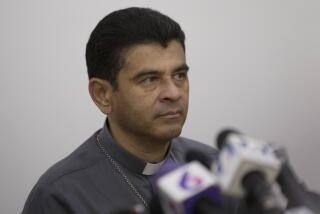Sandinistas Criticized for Barring Priest’s Re-Entry
- Share via
NIQUINOHOMO, Nicaragua — Cardinal Miguel Obando y Bravo on Sunday cautiously protested the forced exile of Msgr. Bismark Carballo, the Roman Catholic Church’s principal spokesman here. He also said the church will seek God’s help in the face of the Sandinista regime’s growing crackdown on domestic dissent.
“We remain in the hands of God. . . . We will keep working. We should not succumb to a psychosis of anguish,” Obando said.
Carballo, who has had a history of run-ins with the Marxist-led government, was the director of the church’s radio station, Radio Catolica, until the Sandinistas closed it in January. The 36-year-old priest was en route home from an overseas trip when he was denied passage Saturday on a flight from Miami to Managua because the airline was advised that he would be refused re-entry into Nicaragua.
“The government should reflect on this issue because Carballo is not a foreign priest,” Obando said. “Every Nicaraguan wants to be in his country. Carballo wants to be in his country. Since they will not let him, it is a forced exile.”
Renegade General’s Birthplace
Obando spoke to reporters after celebrating Mass in a 297-year-old church in this town about 25 miles south of Managua. Niquinohomo is locally famous as the birthplace of Augusto Cesar Sandino, a renegade army general who led peasant guerrillas in an insurgency against U.S. Marines based in Nicaragua in the late 1920s and early 1930s. The Sandinistas take their name from him.
The ban on Carballo was the latest move in a new government crackdown on dissent that began Thursday, a day after the U.S. House of Representatives passed a measure giving $100 million in mostly military aid to U.S.-backed rebels fighting the Sandinistas in the countryside here.
Responding to what they called an open declaration of war on Nicaragua, Sandinista leaders have vowed to tightly restrict the activities of their domestic opponents, whom they view as agents of U.S. policy, and closed down La Prensa, the country’s only opposition daily newspaper.
Obando said Sunday that La Prensa “played an important role. . . . It was a newspaper read by the majority of Nicaraguans.” He said that after “slowly strangling” La Prensa, the Sandinistas delivered the “coup de grace” with its closure.
Repeated Clashes
Obando, Carballo and others in the church hierarchy have for years harshly criticized the Sandinistas as totalitarians and accused the government of religious persecution. The hierarchy also clashes with a pro-revolutionary, so-called “popular church,” whose clerics include three priests serving in Cabinet posts.
Under a state-of-emergency decree issued last October, the Sandinistas closed the office of the church’s Commission on Social Promotion after the church tried to publish a new newspaper not registered with the government. The office was returned to the church this month, but it had been stripped of all its files and furniture.
In January, officials closed Radio Catolica, ostensibly because it failed to join a national radio hookup to broadcast President Daniel Ortega’s New Year’s address.
The Sandinistas have accused Obando and another prelate, Bishop Pablo Antonio Vega, of campaigning for aid to the contras , as the U.S.-backed rebels are called, during trips made by the churchmen to the United States. President Reagan has quoted Obando and Vega in his public appeals for support for aid to the contras.
More to Read
Sign up for Essential California
The most important California stories and recommendations in your inbox every morning.
You may occasionally receive promotional content from the Los Angeles Times.










